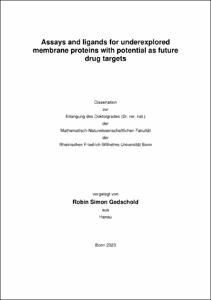Gedschold, Robin Simon: Assays and ligands for underexplored membrane proteins with potential as future drug targets. - Bonn, 2023. - Dissertation, Rheinische Friedrich-Wilhelms-Universität Bonn.
Online-Ausgabe in bonndoc: https://nbn-resolving.org/urn:nbn:de:hbz:5-70652
Online-Ausgabe in bonndoc: https://nbn-resolving.org/urn:nbn:de:hbz:5-70652
@phdthesis{handle:20.500.11811/10865,
urn: https://nbn-resolving.org/urn:nbn:de:hbz:5-70652,
author = {{Robin Simon Gedschold}},
title = {Assays and ligands for underexplored membrane proteins with potential as future drug targets},
school = {Rheinische Friedrich-Wilhelms-Universität Bonn},
year = 2023,
month = may,
note = {In this study, pharmacological assays were established and employed to identify and characterize compounds regarding their potential as tool compounds, lead structures, and drug candidates for three underexplored potential drug targets.
MRGPRX4 is a primate-specific orphan receptor, about which only little is known. Potent MRGPRX4 ligands have been hypothesized to be suitable for a wide range of therapeutic applications, such as wound healing, cancer, itch, and pain. In order to investigate the proposed indications, a tool-box containing potent agonists and antagonists, as well as assay systems are required. Yet, only few weakly potent agonists and no antagonists are described in literature so far. The reported agonists are not employable as tool compounds due to their lack of potency and selectivity.
A radioligand binding assay was successfully established and used for investigating binding and kinetic parameters of the radioligand as well as unlabeled MRGPRX4 ligands. New agonists, which are based on a xanthine scaffold, were optimized to increase their potency, yielding agonists with sub-nanomolar EC50 values. Close investigation of their structure-efficacy relationships allowed the development of xanthine derivatives that acted as potent antagonists. Moreover, recently discovered biphenyl and oxyphenbutazone derivatives were examined with regard to their inhibitory activity on MRGPRX4.
GPR18 is an orphan G protein-coupled receptor (GPCR) with controversially discussed pharmacology. Before the start of this thesis, a series of chalcone-based compounds were identified as GPR18 agonists by our group. As these compounds are known to trigger a specific kind of programmed cell death, namely methuosis, this thesis aimed to investigate whether GPR18 activation leads to methuosis. We reproduced methuosis in different cell lines and studied the compounds effects on cell viability and morphological changes. However, methuosis could not yet be unambiguously proven to be GPR18-dependent.
Connexin-43 forms gap junctions (GJs) between two adjacent cells and thereby allows the free diffusion of small molecules. Under pathological conditions this physiological process can be disturbed. We developed a screening assay to detect modulators of GJ activity. In the framework of this thesis the new assay was validated.},
url = {https://hdl.handle.net/20.500.11811/10865}
}
urn: https://nbn-resolving.org/urn:nbn:de:hbz:5-70652,
author = {{Robin Simon Gedschold}},
title = {Assays and ligands for underexplored membrane proteins with potential as future drug targets},
school = {Rheinische Friedrich-Wilhelms-Universität Bonn},
year = 2023,
month = may,
note = {In this study, pharmacological assays were established and employed to identify and characterize compounds regarding their potential as tool compounds, lead structures, and drug candidates for three underexplored potential drug targets.
MRGPRX4 is a primate-specific orphan receptor, about which only little is known. Potent MRGPRX4 ligands have been hypothesized to be suitable for a wide range of therapeutic applications, such as wound healing, cancer, itch, and pain. In order to investigate the proposed indications, a tool-box containing potent agonists and antagonists, as well as assay systems are required. Yet, only few weakly potent agonists and no antagonists are described in literature so far. The reported agonists are not employable as tool compounds due to their lack of potency and selectivity.
A radioligand binding assay was successfully established and used for investigating binding and kinetic parameters of the radioligand as well as unlabeled MRGPRX4 ligands. New agonists, which are based on a xanthine scaffold, were optimized to increase their potency, yielding agonists with sub-nanomolar EC50 values. Close investigation of their structure-efficacy relationships allowed the development of xanthine derivatives that acted as potent antagonists. Moreover, recently discovered biphenyl and oxyphenbutazone derivatives were examined with regard to their inhibitory activity on MRGPRX4.
GPR18 is an orphan G protein-coupled receptor (GPCR) with controversially discussed pharmacology. Before the start of this thesis, a series of chalcone-based compounds were identified as GPR18 agonists by our group. As these compounds are known to trigger a specific kind of programmed cell death, namely methuosis, this thesis aimed to investigate whether GPR18 activation leads to methuosis. We reproduced methuosis in different cell lines and studied the compounds effects on cell viability and morphological changes. However, methuosis could not yet be unambiguously proven to be GPR18-dependent.
Connexin-43 forms gap junctions (GJs) between two adjacent cells and thereby allows the free diffusion of small molecules. Under pathological conditions this physiological process can be disturbed. We developed a screening assay to detect modulators of GJ activity. In the framework of this thesis the new assay was validated.},
url = {https://hdl.handle.net/20.500.11811/10865}
}






